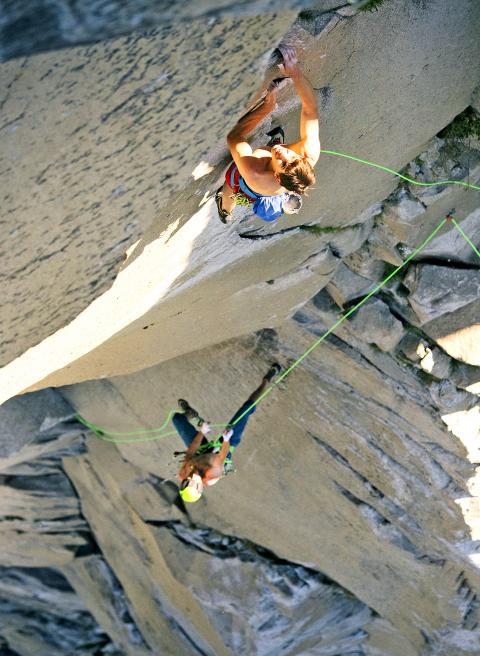After two of the world’s most celebrated rock climbers twice set astonishingly fast records on the biggest wall in Yosemite National Park in a week, they did it again on Wednesday, breaking a mark compared with track’s four-minute mile.
Alex Honnold and Tommy Caldwell scaled El Capitan’s 915m sheer granite wall in 1 hour, 58 minutes, 7 seconds, Honnold said.
The blisteringly fast pace capped weeks of practice climbs up the so-called Nose route that runs up the middle of the massive monolith towering above Yosemite Valley.

Photo: AP / Corey Rich / Reel Rock / Novus Select
It also came just days after two speed climbers fell to their deaths on the peak.
Honnold did not think they were on a record pace until he pulled his phone out and looked at his timer as he ran for the tree that marks the official finish line, he said by telephone as he hiked down from the summit.
“Oh my god, we’re doing it,” he thought to himself as he secured the rope around the tree and hoped Caldwell would hustle up the final pitch. “It was slightly emotional when we finished it. I had a wave of ‘Oh wow.’ I’m pretty proud we saw it through.”
The duo broke the Nose record three times in the past week, carving more than 20 minutes off a mark set last year.
Honnold said it would have been easy to stop after setting records Monday and on May 30, but they pressed toward the two-hour goal he considered the “human potential” for the route.
Hans Florine, who has held the speed record for the climb on and off between 1990 and 2012 — the last time with Honnold — said the new mark is equivalent to the ongoing quest to break the two-hour marathon or Roger Bannister’s 1954 achievement in the mile.
“We were pushing the five-hour barrier before and then the four-hour barrier and then the three-hour barrier. So which one of those is the four-minute mile?” Florine said before the mark was broken. “I think it is getting close.”
Climbing times on El Cap have fallen precipitously since the first ascent of the cliff 60 years ago by Warren Harding and two others. That milestone took 12 days in a final push that followed 48 days of advance work over 18 months, as Harding pounded bolts into the route to aid his climb.
“As I hammered in the last bolt and staggered over the rim, it was not at all clear to me who was the conqueror and who was the conquered,” Harding said.
Yosemite is mecca for climbers around the world because of its vast array of beautiful soaring granite walls and peaks, but El Cap looms largest and offers 58 distinct routes. The Nose is the best known and typically takes accomplished climbers four or five days.
Climbers jam hands and feet into finger and fist-width cracks to inch their way up the vertical wall. Ledges large enough to camp on offer respite, but sometimes there is little more to grasp or perch on than a sliver the width of a few coins. Other cracks come abruptly to an end in a sea of smooth granite, forcing climbers to swing 9m left or right to find the next hand or foothold.
Speed can come with a devastating price. Climbers are roped together for safety and they clip their lifeline into protective pieces that they place in cracks along the way to catch them if they fall, but the amount of gear in a race against the clock is pared to the bare minimum to save weight and climbers sometimes move in tandem with neither anchored to the rock.
The two expert climbers killed on Saturday last week were speed climbing in that manner on El Cap’s Freeblast route when one fell and pulled the other 305m to their deaths.
Last year, Quinn Brett, a former women’s speed record holder on the Nose, was trying to improve her time when she fell and slammed into ledge below, leaving her paralyzed below the waist.
Caldwell took 18m and 30.5m falls during practice runs, but was uninjured, said photographer Austin Siadak, who has been shooting video of the team for a documentary.
“It was pretty scary, because it was such a gargantuan fall,” Siadak said of the larger fall. “I saw him hurtling upside down through the air and then bouncing on the end of the rope.”
However, once Caldwell came to a rest, he chalked up his hands, swung over to a crack and resumed his upward progress.

Brazil has four teams, more than any other country, in the expanded Club World Cup that kicked off yesterday in the US, but for SE Palmeiras, the competition holds a special meaning: winning it would provide some redemption. Under coach Abel Ferreira since 2020, Palmeiras lifted two Copa Libertadores titles, plus Brazilian league, cup and state championships. Even before Ferreira, it boasted another South American crown and 11 league titles. The only major trophy missing is a world champions’ title. Other Brazilian clubs like Fluminense FC and Botafogo FR, also in the tournament, have never won it either, but the problem for Palmeiras

Manchester City on Monday completed the signing of left-back Rayan Ait-Nouri from Wolverhampton Wanderers for a reported £31 million (US$41.8 million). The 24-year-old Algeria international has signed a five-year contract and will be available for the FIFA Club World Cup, which begins later this week. Ait-Nouri is expected to be just one of a trio of new City faces for that tournament with deals close to completion for AC Milan midfielder Tijjani Reijnders and Olympique Lyonnais playmaker Rayan Cherki. After missing out on a major trophy in the recently completed season for the first time since 2016-2017, City are hoping

Paris Saint-Germain’s Lee Kang-in has pleaded with South Korea fans to get behind the team at the 2026 FIFA World Cup after more boos were aimed at coach Hong Myung-bo despite leading them to qualification. South Korea reached next year’s finals in North America without losing a game, but that does not tell the whole story. The country’s soccer association has been in the firing line, having scrambled about to find a successor after sacking the unpopular Jurgen Klinsmann in February last year. They eventually settled on Hong, the decorated former skipper who had an unsuccessful stint as coach in 2013-2014, during which

Lionel Messi drew vast crowds and showed flashes of his brilliance when his Inter Miami side were held to a goalless draw by African giants Al-Ahly as the revamped FIFA Club World Cup got off to a festive start on Saturday. Fans showed up en masse for the Group A clash at the Hard Rock Stadium, home to the NFL’s Miami Dolphins, but Messi could not fully deliver, his best chance coming through a last-second attempt that was deflected onto the crossbar. Inter Miami next face FC Porto on Thursday in Atlanta, while Al-Ahly, who benefited from raucous, massive support, are to